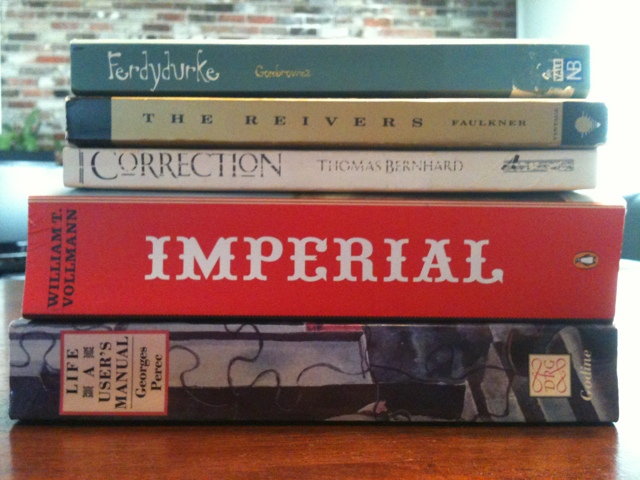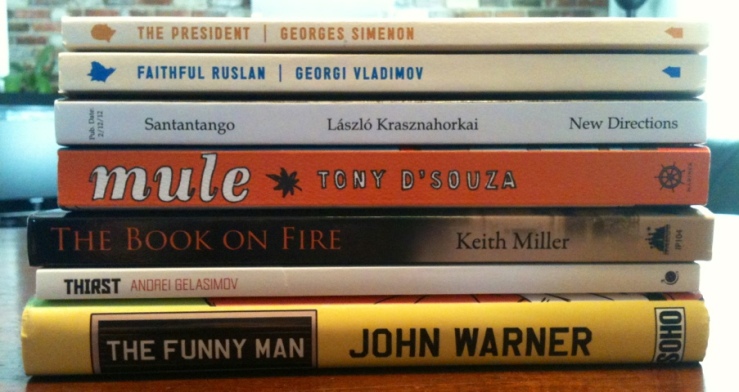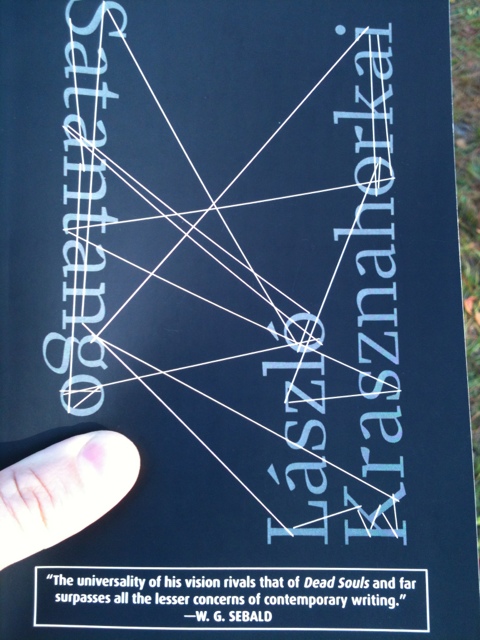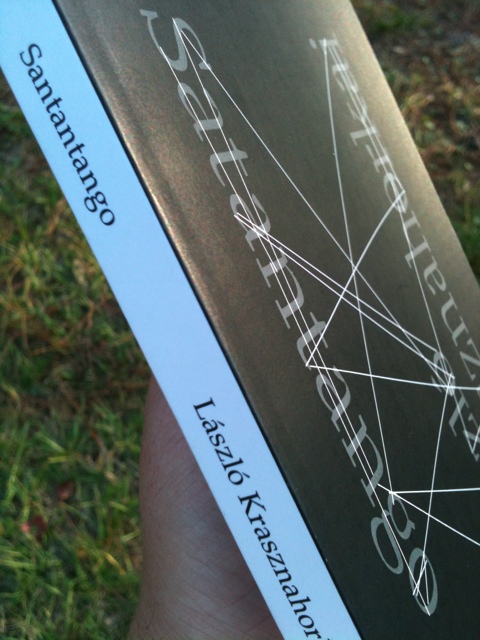A (perhaps titular) scene from Bela Tarr’s film Sátántangó (1994). Based on the novel of the same name by László Krasznahorkai.
Tag: Sátántangó
He saw himself nailed to the cross of his own cradle and coffin | From László Krasznahorkai’s Satantango
He gazed sadly at the threatening sky, at the burned-out remnants of a locust-plagued summer, and suddenly saw on the twig of an acacia, as in a vision, the progress of spring, summer, fall and winter, as if the whole of time were a frivolous interlude in the much greater spaces of eternity, a brilliant conjuring trick to produce something apparently orderly out of chaos, to establish a vantage point from which chance might begin to look like necessity …and he saw himself nailed to the cross of his own cradle and coffin, painfully trying to tear his body away, only, eventually, to deliver himself—utterly naked, without identifying mark, stripped down to essentials—into the care of the people whose duty it was to wash the corpses, people obeying an order snapped out in the dry air against a background loud with torturers and flayers of skin, where he was obliged to regard the human condition without a trace of pity, without a single possibility of anyway back to life, because by then he would know for certain that all his life he had been playing with cheaters who had marked the cards and who would, in the end, strip him even of his last means of defense, of that hope of someday finding his way back home.
An excerpt from the beginning (and end) of László Krasznahorkai’s novel Satantango. English translation by George Szirtes.
I listened to the audiobook of Satantango last week and then launched into it again, reading bits in tandem with my New Directions edition from years ago, finding it funnier, richer, and more complex than I’d initially thought, its plot threads clarifying more easily in a reread. I think this passage does a nice job of laying out the novel’s themes of abjection, time (and deep time), observation (and surveillance), and life as one big con.
Satantango (Book Acquired, 3.15.2012)

Was happy to get a finished copy of Laszlo Krasznahorkai’s Satantango (new in English translation for the first time from the good people at New Directions). From Jacob Silverman’s review at The New York Times:
As in much of Krasznahorkai’s work, a sense of hallucinatory conspiracy is in the air. People speak ominously, if vaguely, about what lies ahead. They see visions and hear bells they can’t place. “If they read the papers properly,” one character says, “they would know that there is a real crisis out there.”
But there is also a shared belief that things aren’t as they appear. Some mistake must have been made; things can’t be as bad as they seem. And so the residents “are waiting. They’re waiting patiently, like the long-suffering lot they are, in the firm conviction that someone has conned them. They are waiting, belly to the ground, like cats at pig-killing time, hoping for scraps.” (This repetition, with its gradual slathering of metaphoric detail, characterizes Krasznahorkai’s style.)
I started the ARC I got of Satantango (mistitled on the spine; see below), but got sidetracked with epic books by William Gaddis and William Vollmann. (Blame the Bills). I will give the book my full attention in the nearish future.

Books I Didn’t Read in 2011 (And Books I Will Try to Read in 2012)
Okay. So obviously a list of the books I didn’t read in 2011 would be, y’know, long.
This post is about the books I set out to read, tried to read, wanted to read, abandoned, neglected, acquired and thought looked interesting, etc. It’s also about what I want to—what I plan to—read in 2012.

A reasonable starting place: I wrote a post in early January of this year detailing the books I would try to read in 2011. I actually read most of the books I named in that post. But:
I failed to read past page 366 of Adam Levin’s incredibly long novel The Instructions, although I think I was a bit too harsh in my semi-review. Chalk it up to exhaustion.
I failed to even begin to try to read William Gaddis’s incredibly long novel JR. (But I swear to read it one year. Not next year, but maybe the year after?).
I failed to read past the first chapter of Katherine Dunn’s Geek Love.
I read most of the Tintin collections I picked up last year, but I didn’t get to volumes 5 or 6.

Moving beyond that early post, books that I recall abandoning (although I’m sure there must be more):
I abandoned Nathaniel Hawthorne’s Italian romance The Marble Faun after about 30 pages.
I abandoned 334 by Thomas Disch after about 50 pages. Somehow simultaneously dense and loose, it struck me as intensely imagined and sloppily composed.
I abandoned John Williams’s Butcher’s Crossing after the first chapter; it was a great opening chapter, but I thought it was going to be, I don’t know, more like Blood Meridian.
I also abandoned Chad Harbach’s big book The Art of Fielding (after 100 pages) because it was lame (notice it’s not pictured above because I traded in that sucker), but I had a nice dialog with some readers who responded to a post I wrote about abandoning it, so that was a plus.

Books I bought in 2011 that I aim to read in 2012:
Correction by Thomas Bernhard. Bernhard was a repeated suggestion from readers in the aforementioned Harbach post/rant, and he was apparently a huge influence on W.G. Sebald, so, yes, looking forward to this.
The Reivers by William Faulkner. I read A Light in August this year and reread most of Go Down, Moses. My plan is to read one Faulkner a year for the next ten years.
Ferdydurke by Witold Gambrowicz. I struggled to make it through Gombrowicz’s bizarre jaunt Trans-Atlantyk, but once the novel taught me how to read it, I was enchanted by its strange humor and frenetic syntax. Over some beer and wine, I had a conversation about Ferdydurke with my father-in-law’s priest who is Polish. His pronunciation of Ferdydurke should win an award for charm.
I will read Georges Perec’s big book Life: A User’s Manual.
I have already promised to read William Vollmann’s Imperial.
There are many, many more, of course (too many, really).

Books people sent me to read and review that look really cool that I will be reading and reviewing at some point in the very near future:
Satantango by László Krasznahorkai: I will read this and review this in the very near future.
The Funny Man by John Warner: Comedy, drugs, celebrity culture.
The Book on Fire by Keith Miller: This one is about a biblioklept. It’s been at the top of my stack for a few months now, but I keep letting myself get distracted.
Thirst by Andrei Gelasimov: Apparently this novella about a maimed alcoholic war vet is funny. (I hate the cover).
Mule by Tony D’Souza: Middle class man sells marijuana cross country. (I love the cover).
Various titles from Melville House’s Neversink line: I’ve got a few in the stack.
Also: I got a Kindle Fire for Christmas. I actually stayed up really late last night reading free public domain books from Hawthorne, Melville, Whitman, and Dickinson; I’ll read a contemporary novel on it this year—Neal Stephenson’s Snow Crash, perhaps? Suggestions welcome!—and try to review both novel and the process of reading the novel on a warm glowing machine.
And: I’m sure there are a ton of novels that will come out in 2012 that I’ll want to read; I’m already primed for Dogma, Lars Iyer’s sequel to Spurious.
So: What are you guys looking forward to reading in 2012? What did you fail to read in 2011?
Book Acquired, 12.06.2011 — Or, I Photograph My Reader’s Copy of Satantango in the Cheap Showiness of Nature

Damn. Check this out. László Krasznahorkai’s novel Satantango, the title of which does not apparently include diacritical marks in its new (first published!) English translation.
Publisher New Direction’s description:
Already famous as the inspiration for the filmmaker Béla Tarr’s six-hour masterpiece, Satantango is proof, as the spellbinding, bleak, and hauntingly beautiful book has it, that “the devil has all the good times.” The story of Satantango, spread over a couple of days of endless rain, focuses on the dozen remaining inhabitants of an unnamed isolated hamlet: failures stuck in the middle of nowhere. Schemes, crimes, infidelities, hopes of escape, and above all trust and its constant betrayal are Krasznahorkai’s meat. “At the center of Satantango,” George Szirtes has said, “is the eponymous drunken dance, referred to here sometimes as a tango and sometimes as a csardas. It takes place at the local inn where everyone is drunk. . . . Their world is rough and ready, lost somewhere between the comic and tragic, in one small insignificant corner of the cosmos. Theirs is the dance of death.” “You know,” Mrs. Schmidt, a pivotal character, tipsily confides, “dance is my one weakness.”
New Directions has a fantastic record when it comes to lit in translation, and Satantango has been long anticipated by English-reading audiences, due in large part to Béla Tarr’s movie (which is more like seven and a half hours, which I meant to watch this summer but couldn’t because I want to watch it with no interruptions, but I have kids and a wife, so, hey).
I got into it a bit last night, and, I don’t know if it’s just the advance reader copy I got or what, but there are no paragraph breaks, which is a grueling rhetorical technique, a big dare to readers, really (see also: W.G. Sebald’s Austerlitz (note: Sebald blurbs Satantango)). The advance reader copy also has a delightful typo on the spine, one that makes the book sound like, I dunno, if Santana made a tango record. Or maybe Santa n’ Tango for ever (Cash will no doubt be jealous). More to come.

